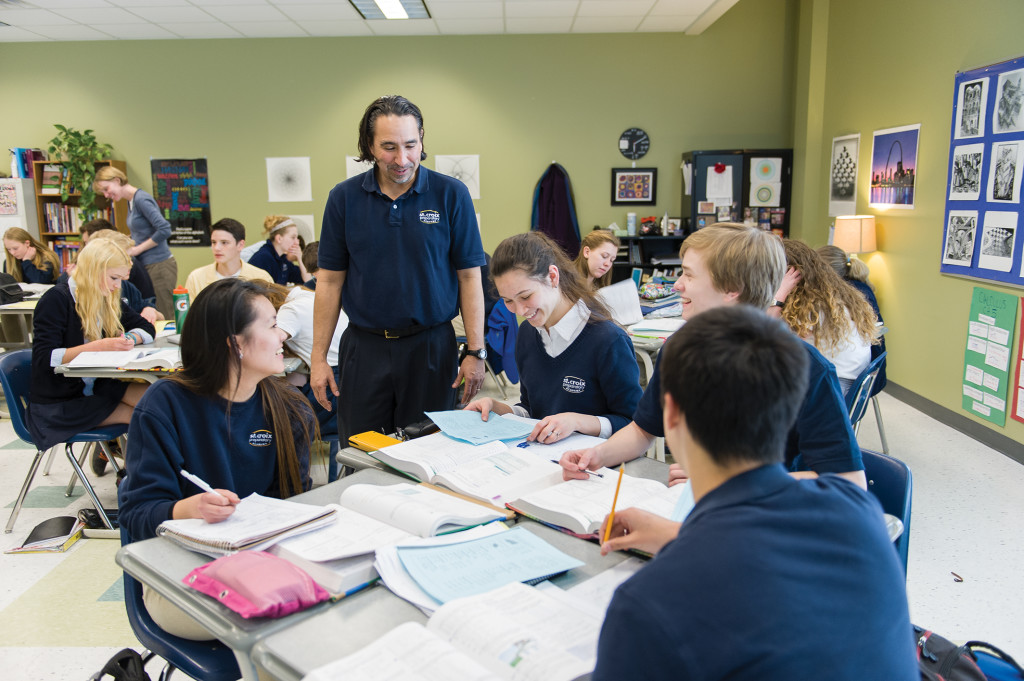
Jon Gutierrez ’82 works with two students at St. Croix Preparatory Academy in Stillwater (Photo by Stan Waldhauser ’71).
During the halftime breaks at varsity basketball games in old Myrum Memorial Fieldhouse, Gustavus Coach Bob Erdman ’56 used to send his senior guard out to the center circle to entertain the crowd. Jon Gutierrez ’82 would juggle and dribble multiple basketballs, spin five balls at once—two on his shoetops, two on his fingers, even one from a pen held between his teeth—and otherwise wow the fans with his dexterity.
Some 30 years later, Jon is still juggling, spinning, and multi-tasking. But now it’s history and literature, and critical thinking and writing skills, and school finances. For Jon is executive director of and the driving force behind Stillwater’s St. Croix Preparatory Academy, one of the most successful charter schools in Minnesota.
St. Croix Preparatory Academy (SCPA) is a K–12 charter school that opened in former retail spaces in downtown Stillwater, Minn., in the fall of 2004. The school started with 200 students in grades K–7 and has experienced tremendous growth, moving to a new facility on 59 acres of land just south of town in 2009 and enrolling more than 1,100 students in grades K–12 (with a waiting list of more than 450) during the 2013–14 school year.
In 1991 Minnesota became the first state to pass legislation establishing charter schools. The first charter school organized that year enrolled 50 students. Within 15 years nearly 3,600 charter schools across the country enrolled about 1 million students. Charter schools are public schools, receiving state funds. They are nonsectarian and open to all; their students do not pay tuition. At the same time, the State of Minnesota requires that each charter school have a sponsoring or “authorizing” organization, which provides academic and financial oversight and ensures that the school complies with all legal requirements. St. Croix Prep is authorized by Friends of Education, a non-profit educational foundation based in Wayzata, Minn. SCPA also maintains a school board, made up of six parents and three teachers.
“In the Stillwater area, more than 20 percent of the students don’t attend traditional schools,” Gutierrez says. “Parents in this area are comfortable with school choice, and St. Croix Prep is another option in a community that offers many great educational choices.”

Gutierrez entertaining a second grade physical education class (Photo by Stan Waldhauser ’71).
Jon, a native of Ashland, Wis., who majored in accounting at Gustavus, came to education in a round-about way. After graduating from Gustavus he worked briefly as an accountant for Touche Ross (now Deloitte Touche) before becoming a high-tech sales executive with Lawson Software and later rival PeopleSoft. During that time he also enrolled at Trinity International University, where he earned a master of divinity degree. He says he began to direct his energies toward education after noticing the poor writing and weak critical thinking skills around him in the business world.
“Actually, when the bubble burst in 2002 I decided to get out of the tech field,” Jon admits. “I was taking some time off when I connected with a group of parents interested in educational issues and thinking about starting a private or charter school. I was probably on the edge of their conversations—I wasn’t really involved in a lot of it, but I was aware of some of the trends and issues. Basically, I was the one who had time on his hands. The group encouraged me to think about starting a school. My background in the tech field—it was high growth in those days—was starting things, getting things going. I agreed to do it for a year, and it’s now ten years later . . .”
By the time St. Croix Prep scheduled its first informational meetings in early 2004, Jon had become a leader in articulating the school’s developing mission and was on board as its executive director. More than 60 parents attended the first informational meeting. Some were considering private schools because they wanted a smaller, more focused environment. Some wanted more rigor in the curriculum. But for most, hearing from school director Jon Gutierrez made a distinct impression. “It was clear that he had sound ideas about how a school can and should be run,” reported one parent.
“What we were surprised by was that we were full in six weeks,” Jon says. The K–7 model with about 200 students was already obsolete. St. Croix Prep would outgrow its facilities in five years, building a new school in 2009 and adding a class annually until it graduated its first class of seniors in 2010. “So, what you see here,” Jon deadpans, waving his arms at the far walls of the school’s entrance atrium, “is not what we initially envisioned.”
The businessman in him still orders his work: as the school celebrates its tenth year, he runs it like a business, emphasizing fiscal responsibility, selective staffing, and a constant focus on delivering a quality product. But he’s also personally invested—he and his wife, Kelly, have sent all three of their children to SCPA since it opened: Older daughter Anne started at SCPA in 2004 as a seventh-grader and was a member of the first graduating class in 2010; she is now a senior at Davidson College in North Carolina and will graduate this spring. Son Michael, now a junior, started at SCPA as a second-grader. Younger daughter Grace started as a kindergartener in the school’s first year and is now a ninth-grader.

Gutierrez with a pre-calculus class of 10th, 11th and 12th graders (Photo by Stan Waldhauser ’71).
St. Croix Preparatory Academy is one of a handful of charter schools using the classical liberal arts model as its educational philosophy. The classical model has been around for 2,500 years going back to Plato but has enjoyed a sort of renaissance lately, particularly among charter and private schools. Traditionally, it comprises seven disciplines, of which three—grammar, logic, and rhetoric, known as the “trivium”—were originally taught as prerequisite to the “quadrivium”—arithmetic, geometry, music, and astronomy.
SCPA’s educational model is organized around the trivium, which also specifies the order in which its trio of disciplines is taught. Jon explains that “grammar,” “logic,” and “rhetoric” are used in broader senses than what their dictionary definitions might imply. The grammar stage (for grades 1–4) is the knowledge and comprehension stage. Children are exposed to as much information as possible to satisfy their hunger for facts.
In the logic stage (grades 5–8) the focus shifts to analysis and application of what’s been learned, and students seek patterns and relationships among the facts. Students’ minds are developing and they ask different questions as they start to interact with information. Finally, the rhetoric stage (grades 9–12) involves communication of ideas and focus on synthesis and evaluation. Students argue and defend their opinions and arguments based on their understanding and knowledge of subjects.

Gutierrez helps students get ready to head home for the day (Photo by Stan Waldhauser ’71).
Gutierrez attributes much of SCPA’s success to its classical model. “We teach specific content in a way that’s appropriate for each grade level,” he says. That content includes ancient history and classical literature as well as Latin. For example, the classical model approaches history from the beginning for grades one through four, then again for grades five through eight, and yet again for grades nine through twelve. Each time through the cycle, students focus on a different learning objective according to the three sequential disciplines of the trivium described above.
“Students here learn to be hungry for learning,” Jon maintains. “We emphasize history, world cultures, languages, art, music. It starts at an early age. There’s homework at an early age—that’s somewhat out of trend. It’s built into the culture—there’s a lot of positive peer pressure here. We want to provide the opportunities for these students to aspire to selective colleges and universities.”
“My high school experience was not ‘rigorous,’” Jon admits, “so Gustavus represented a real adjustment. I adapted, and some faculty members helped me. I think of Kevin Byrne, who made history real and learning engaging and exciting. And Milt Brostrom, who was always encouraging even as I reached the limits of my mathematical understanding. And my coaches Whitey Skoog and Bob Erdman, whose significant conversations with me weren’t about basketball at all. I learned the value of learning, the value of study, the importance of hard work.
“I think the model we try to maintain here is to prepare students so that, when they go on to a place like Gustavus, they’re comfortable with the academic expectations and the organizational and time demands they’ll have…The liberal arts approach gives students the means to adapt; they aren’t going to look at things in isolation.”
In March 2013, St. Croix Prep completed a 23,000 sq. ft. expansion that added six middle school classrooms, staff work areas, additional cafeteria space, a fitness center, locker rooms, and a 7,500 sq. ft. multi-purpose performance space for concerts, theater productions, meetings, assemblies, and community events. For the past ten years, St. Croix Prep has consistently been ranked among the top-performing schools in Minnesota Comprehensive Assessment scores; it’s been listed in national magazines’ rankings of top schools in the nation. The school is clearly thriving and an integral part of the Stillwater educational system.
Jon Gutierrez is optimistic about whatever future presents itself. “The world today is a lot different from when I was growing up. There are new pressures, and some of the things these students go through are a lot different from what I had, so I derive a great deal of satisfaction from being in an environment where I can contribute positively to their lives—to see them learn; to see them work through failure, persevere and overcome; to see a new class of kindergarten students and then shake their hands at commencement exercises and know they’ve been launched successfully into the next journey of their lives.”
This story was originally printed in the Summer 2014 edition of The Gustavus Quarterly. Steve Waldhauser ’70 is the Managing Editor of the Quarterly and Director of Editorial Services in the College’s Office of Marketing and Communication.